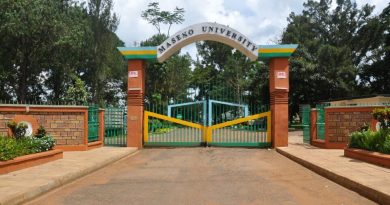Dedan Kimathi University Of Technology PhD Mechanical Engineering Program
A Ph.D. in Mechanical Engineering at Dedan Kimathi University Of Technology is an advanced academic degree that focuses on in-depth research, innovation, and expertise in various aspects of mechanical engineering. It is the highest level of qualification one can obtain in the field and is typically pursued by individuals who have a strong passion for research, desire to contribute to scientific knowledge, and aspire to become leaders in academia, industry, or research institutions.
Qualifications to study PhD Mechanical Engineering Program at Dedan Kimathi University
To study a PhD Mechanical Engineering Program at Dedan Kimathi University one must be a holder of a Master of Science Degree in Mechanical Engineering or Mechatronic Engineering of DeKUT. OR Be a holder of a Master of Science in Mechanical Engineering or Mechatronic Engineering from another institution recognized by DeKUT Senate as being of satisfactory academic status. OR Any other recognized qualification deemed as being an adequate prerequisite for the PhD Mechanical Engineering Degree by DeKUT Senate.
Mode Of Study
Main Campus
Full-Time:3 Years
Part-time:4 Years
About PhD Mechanical Engineering Program at Dedan Kimathi University Of Technology
The field of mechanical engineering encompasses a broad range of subjects, including mechanics, thermodynamics, fluid mechanics, materials science, manufacturing processes, robotics, control systems, and more. Through a Ph.D. program, students delve deeply into these areas, developing a comprehensive understanding of the underlying principles, theories, and methodologies while also honing their research and analytical skills.
The journey towards a Ph.D. in Mechanical Engineering usually begins with a bachelor’s and master’s degree in the same or a related field. However, some institutions may offer integrated Ph.D. programs that allow students to progress directly from a bachelor’s degree. The specific admission requirements can vary among universities, but typically they include a strong academic background, letters of recommendation, a statement of purpose, and satisfactory performance on standardized tests such as the GRE (Graduate Record Examination).
Once admitted into a Ph.D. program, students work closely with faculty advisors to define their research goals and develop a research proposal. This proposal outlines the objectives, methodology, and potential contributions of their research project. The research topic can vary widely depending on the student’s interests and the expertise of their advisor, but it should aim to advance knowledge within the field of mechanical engineering.
Throughout the Ph.D. journey, students undertake rigorous coursework in advanced topics relevant to their research, which helps them acquire a strong foundation in their chosen area of specialization. They may also participate in seminars, workshops, and conferences to broaden their understanding, exchange ideas with peers, and stay up-to-date with the latest advancements in their field.
The core component of a Ph.D. in Mechanical Engineering is the research itself. Doctoral candidates spend a significant portion of their time conducting experiments, simulations, or theoretical analyses to investigate their research questions and hypotheses. They collect and analyze data, interpret their findings, and draw conclusions that contribute to existing knowledge or propose new approaches and solutions to engineering problems.
Ph.D. students are often encouraged to collaborate with other researchers, both within their own institution and at external organizations. Such collaborations foster interdisciplinary perspectives and allow for the exchange of ideas and expertise. Additionally, they may have opportunities to publish their research in reputable scientific journals and present their work at conferences, which helps to disseminate their findings to the scientific community.
The duration of a Ph.D. program in Mechanical Engineering can vary, but it typically takes around four to six years to complete. However, this timeline is highly dependent on factors such as the student’s research topic, the scope of the project, and individual progress.
Upon successful completion of the Ph.D. program, graduates are equipped with advanced knowledge, critical thinking skills, and expertise in a specialized area of mechanical engineering. They are well-positioned for diverse career opportunities, such as becoming university professors, research scientists, industry leaders, consultants, or entrepreneurs. Their expertise can be applied to various fields, including automotive engineering, aerospace, energy systems, robotics, biomedical engineering, manufacturing, and more.
Related>>>List Of Courses Offered By Dedan Kimathi University of Technology




